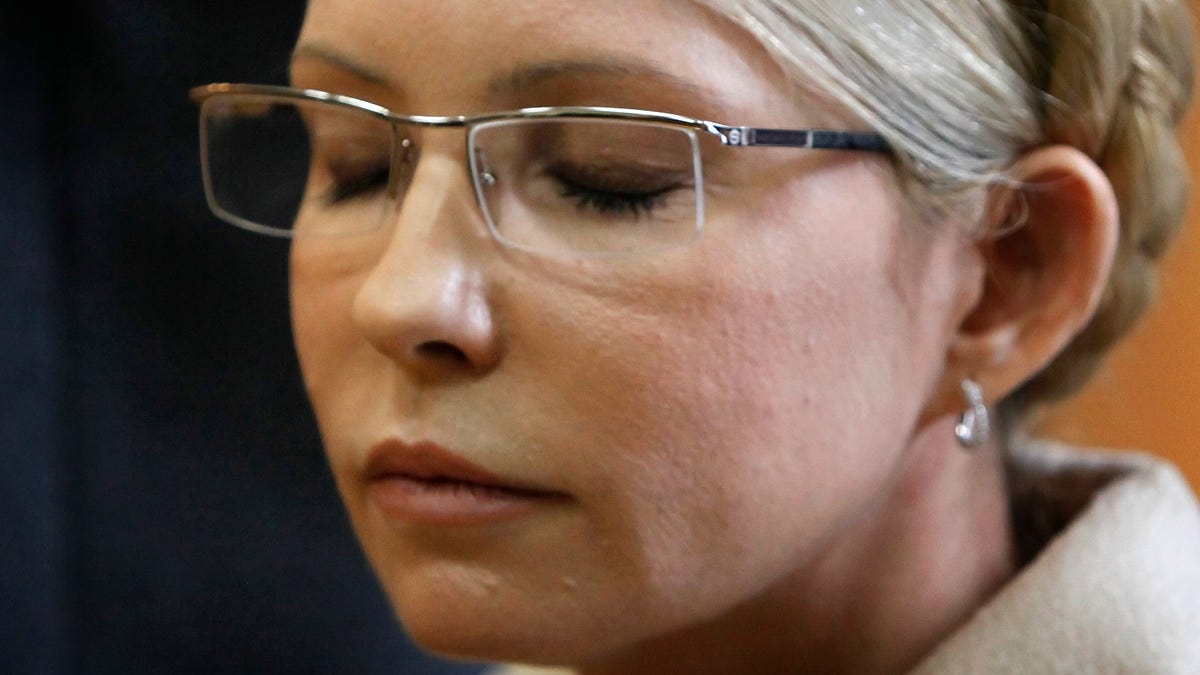
Former Ukrainian Prime Minister Yulia Tymoshenko reacts during her trial, at the Pecherskiy District Court in Kiev, Ukraine, Tuesday, Oct. 11, 2011. (AP2011)
PRAGUE -- The husband of jailed former Ukrainian Prime Minister Yulia Tymoshenko was granted political asylum in the Czech Republic on Friday, and a lawyer said he left his country because its government has launched a criminal investigation against him.
Last year, the Czech Republic angered Ukraine by granting asylum to another ally of Yulia Tymoshenko's, and Friday's decision to do that with her husband is likely further strain the countries' relations.
Czech Interior Ministry spokesman Vladimir Repka said his ministry approved the application submitted by Oleksandr Tymoshenko, but refused to provide details about the decision.
Yulia Tymoshenko, Ukraine's top opposition leader and a former presidential candidate, was sentenced to seven years in jail in October in a trial the West has condemned as politically motivated. She has reportedly been in poor health and denied medical care while locked up in a Kiev, Ukraine, prison before she was taken to a remote prison colony in the city of Kharkiv. In December, the European Union balked at signing a landmark cooperation agreement with Ukraine over the jailing of Tymoshenko.
In Ukraine, Yulia Tymoshenko's lawyer, Serhiy Vlasenko, said in remarks broadcast Friday on Russia's NTV television that Oleksandr Tymoshenko had asked for asylum in the Czech Republic because he is being targeted in an ongoing probe into his wife's business activities when she owned a top Ukraine's energy company. Vlasenko said Oleksandr requested asylum because a criminal investigation has been launched against him in Ukraine in an attempt to increase pressure on his jailed wife.
A year ago, the republic granted political asylum to Ukraine's former Economics Minister Bohdan Danylyshin, one of Tymoshenko's allies, who was charged with abuse of office in his country. The move strained relations between the two countries.
In May, Ukraine expelled two employees at the military section at the Czech Republic's Embassy in Kiev, accusing them of espionage. Czech officials said that was probably prompted by Danylyshin's case.
However, Czech Interior Minister Jan Kubice said Friday that he doesn't believe the decision granting Oleksandr Tymoshenko asylum will harm his country's relations with Ukraine. Kubice said Tymoshenko applied for asylum several months ago.
Jakub Kulhanek, an analyst at Prague's Association International Affairs, said the decision is in line with the Czech foreign policy that supports opposition movements in Cuba, Belarus, Maynmar and elsewhere. But he also said Tymoshenko, a businessman, "can hardly be called a typical political dissident."
Kulhanek said he doesn't expect serious retaliation from Ukraine, which has been trying to consolidate its relations with the European Union.
At the same time, Kulhanek said, it is in the EU's interest that Ukraine is a stable country and the bloc is trying to avoid steps that would push Kiev back into Russia's orbit.
According to the Czech register of companies, a man called Oleksandr Tymoshenko is listed as a co-owner of International Industrial Projects SRO, a company based in the northern Czech city of Usti nad Labem.
Tymoshenko's husband had attended her trial in October and may also have sought asylum in the Czech Republic for personal reasons, including the ability to publicize her case.
Earlier Friday, Czech Foreign Minister Karel Schwarzenberg confirmed Tymoshenko's husband had applied for asylum, and that ministry said in a statement that it wants to maintain good relations with Ukraine.
